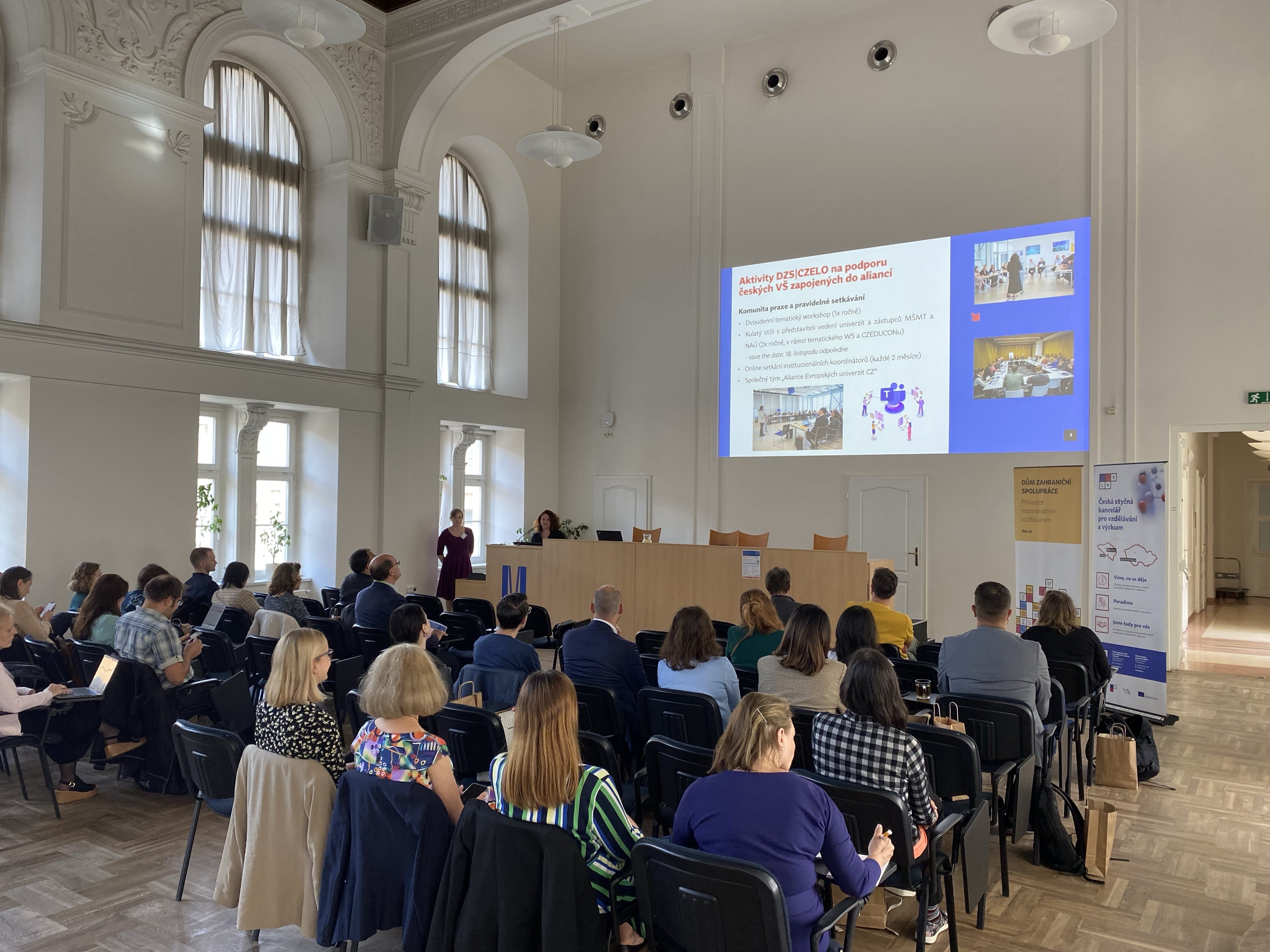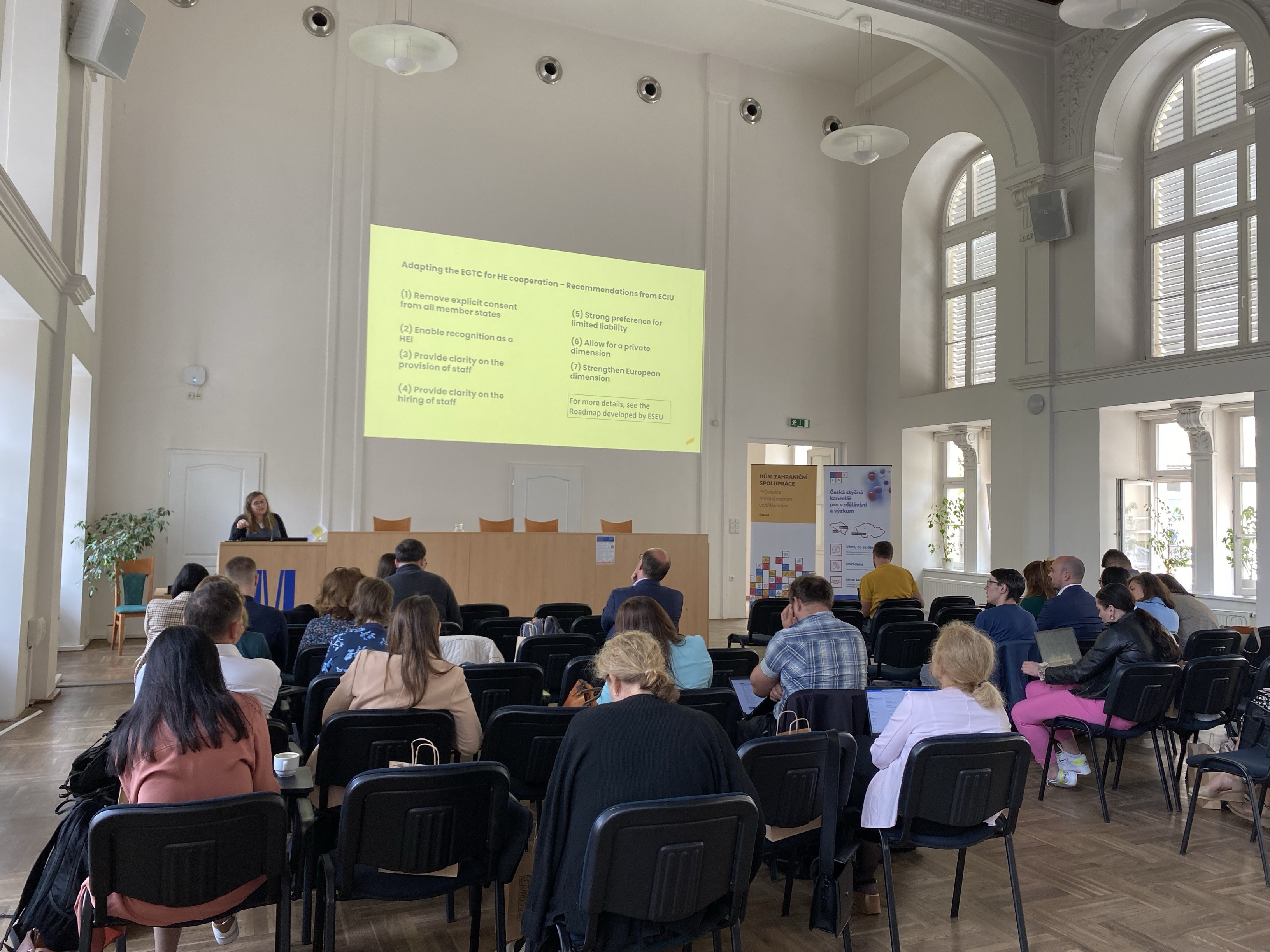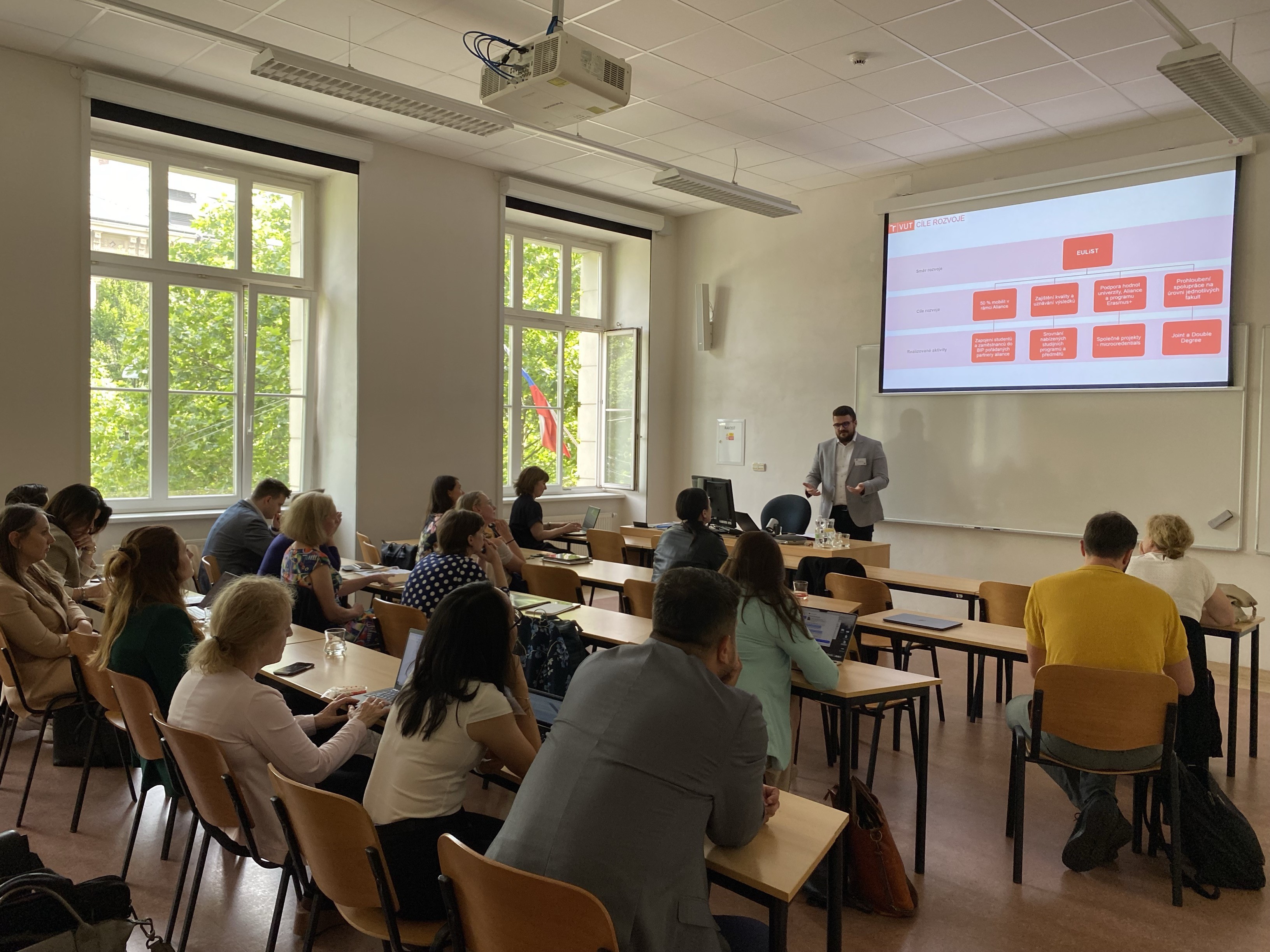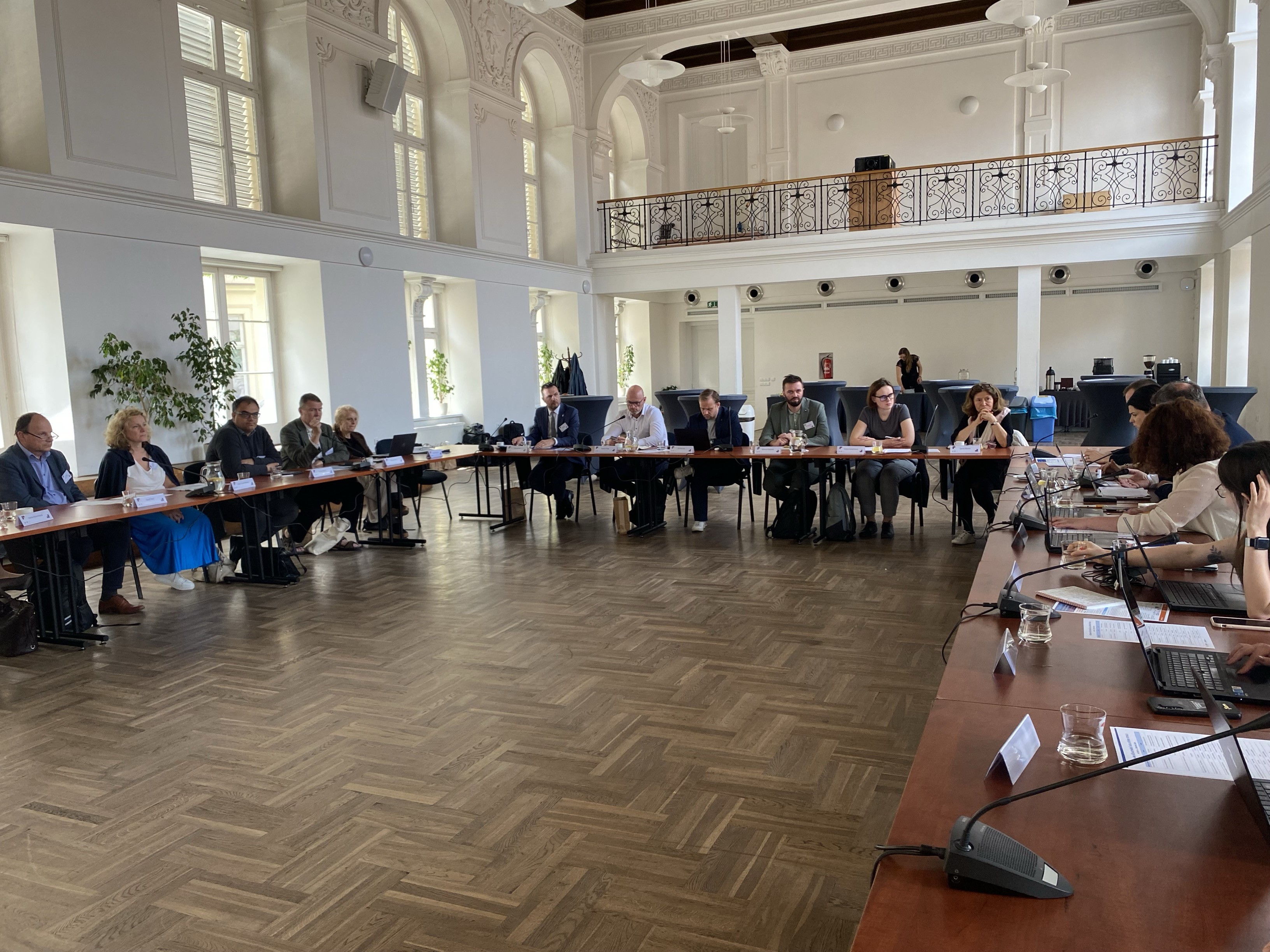Meeting of Czech universities involved in the European University Initiative
On 13-14 June in Brno we organised a meeting of 9 Czech universities involved in alliances of European Universities.
All Czech universities involved in the European Universities Initiative until this date, i.e. the Czech Technical University in Prague, Masaryk University, Charles University, University of Ostrava, Silesian University in Opava, Palacký University in Olomouc, VŠB - Technical University in Ostrava, Brno University of Technology and University of West Bohemia in Pilsen, met at Masaryk University in Brno.
Participants discussed current topics and common challenges and shared their experiences and insights. The workshop also included a roundtable of representatives of university management, the Ministry of Education, Youth and Sports and the National Bureau of Accreditation on joint study programmes, quality assurance and the global dimension of alliances. Foreign representatives of the alliances CIVIS and ECIU also enriched the fruitful discussions by sharing experience and best practice of these alliances as well as presenting the pilot projects SMARTT and ESEU.

Legal status of alliances: a national versus a European instrument
In Thursday's first joint workshop , Daniela Craciun from the ECIU alliance presented the topic of legal entity of alliances. The ECIU has had legal status as a Foundation under Dutch law since 2006, before it became part of the European University Initiative, and has been running a one-year ESEU pilot project. It was one of 4 projects funded by the European Commission to test the possibilities of legal status for alliances at EU level. According to ESEU, national frameworks do not meet the needs of alliances for deep international cooperation (joint staff recruitment, fundraising, offering joint micro-certificates, etc.)., but existing EU legal instruments such as EGTC and EEIG do not correspond to the specific needs of HEIs. The ESEU project therefore recommends either creating a new European legal instrument dedicated exclusively to cross-border partnerships between educational institutions or adapting an existing instrument such as the EGTC to meet the requirements of academic cooperation.
The presentation was followed by a discussion on the feasibility of creating or adapting the necessary instrument at EU level, but also sharing the experience of alliances that have legal status under national law, such as the 4EU+ alliance, which includes Charles University. It has newly established its legal status under Belgian law and plans to move its headquarters to Brussels in 2025.

Global dimension, mobility, digital tools, research dimension of alliances and student engagement
In the following afternoon workshops, participants presented their alliance practices in different areas and discussed shared barriers and possible solutions. A representative of Palacký University in Olomouc, member of the Aurora alliance, presented on the global dimension of alliances. Aurora has three different tools for cooperation: The Aurora Global Network, which predates the European University and enables collaboration with partners from around the world including Ukraine, the USA and Africa; the European University supported alliance; and individual projects. In the discussion that followed, participants presented their approaches to global cooperation (e.g. 4EU+ collaborates with Ukrainian HEIs but also with the University of Geneva, offering unique project opportunities due to the presence of international organisations, while CIVIS cooperates mainly with African partners).
An important topic addressed by participants in one of the workshops was mobility, and how to reach the target of 50% mobile students across the alliance. How the Brno University of Technology, in the EULiST alliance, and the University of West Bohemia in Pilsen, in the EUPEACE alliance, are approaching this challenge was presented by representatives of these two HEIs. The discussion raised questions about the definition and recording of mobility both within the HEI and within the alliance, the need to fund mobility beyond Erasmus+ and the alliance budget, as well as the involvement of university staff in work packages and the need to develop a common tool for recording mobility.
Representatives of Masaryk University and Czech Technical University in Prague shared their experience in creating common digital tools and online course offers in the EDUC and EuroTeQ alliances. During the presentation and discussion, the main points were the need to harmonise the different systems and standards of the partners and the risks associated with a single system. Challenges include, for example, the different approaches to GDPR protection in different countries, ensuring uniform automated enrolment of students in online courses and the decline in student interest in exclusively online courses.
Next workshop focused on the scientific and research dimension of alliances. After presentations by Daniela Craciun from the ECIU alliance and a representative of the Silesian University in Opava, in the STARSEU alliance, there was a discussion on the topic of seed grants supporting collaboration of researchers in the alliance, the organisation of alliance research groups and the balance between the influence and level of private funding.
Last but not least, participants debated and shared practices in the field of student involvement in alliance management. Representatives of the University of Ostrava and VŠB - Technical University of Ostrava presented their approach to this topic within the framework of the NEOLAiA and U!REKA alliances. During the discussion, the participants focused mainly on the topics of continuity of the work of student representatives after their departure, motivation of students to get involved in the management of the alliance, including the possibility of financial remuneration, and the method of selecting student representatives.

Joint study programmes and the European Degree
On Friday, the morning workshop and the roundtable focused on joint study programmes and the March "Higher Education Package" published by the European Commission as a roadmap for a European Degree. Two proposals of Council recommendations, which are part of the package, are expected to be discussed by the Council of the EU during the Hungarian presidency in the second half of this year. The European Degree, or European Degree label, could in future be awarded by HEIs or possibly alliances that have undergone inter-institutional external quality assurance by an agency that is part of EQAR. However, this requires the creation of a truly European quality assurance system, which is likely to be a long way off.
The label or the European Degree should only be awarded to joint degree programmes that meet the criteria proposed by the Commission and tested by six pilot projects. Two of these projects were represented at the joint workshop on Friday - the ED-AFFICHE project presented by Charles University (4EU+) and the SMARTT project presented by Simona Iftimescu from the CIVIS Alliance. Both presenters also shared their experiences concerning joint programmes in the alliance. The discussion showed that most alliances are interested in the European Degree and many are planning joint degree programmes.

During the roundtable, participants discussed the current situation and future prospects with representatives of the Ministry of Education, Youth and Sports and the National Bureau of Accreditation. The main points were in particular the expected position of Czechia on the European Degree, the implementation of the European Approach on Czech territory, as well as visa issues in the context of global partnerships of the alliances.
Another meeting is planned for next year, but the topic of European universities will not miss at the CZEDUCON conference in November. Next time, the number of Czech universities represented will rise to 12, as the PIONEER (Tomas Bata University in Zlín), HEROES (Mendel University in Brno) and KreativEU (University of South Bohemia in České Budějovice) alliances succeeded in this year's call.